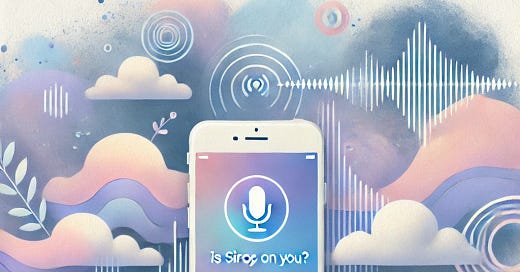Is iPhone's Siri Snooping on You, Even Without the Prompt of "Hey Siri"?
The tech giant agreed to pay $95 million to settle a class-action lawsuit alleging that Siri recorded users' private conversations without their consent.
Is iPhone's Siri Snooping on You?
Apple Inc., long hailed as a guardian of user privacy, recently faced a significant legal challenge regarding its virtual assistant, Siri. The tech giant agreed to pay $95 million to settle a class-action lawsuit alleging that Siri recorded users' private conversations without their consent. This settlement has ignited discussions about the privacy risks associated with AI-powered voice assistants and their implications for users and the tech industry at large.
The Settlement: What You Need to Know
Apple's agreement to settle this lawsuit, which has been ongoing for five years, involves compensating users who owned Siri-enabled devices between September 17, 2014, and December 31, 2024. Key details of the settlement include:
Eligibility for Compensation: Users must declare under oath that Siri accidentally activated during confidential conversations. Eligible users may receive up to $20 per Siri-equipped device, with a maximum claim of five devices per person.
Pending Approval: The settlement awaits final approval from U.S. District Judge Jeffrey White.
While Apple has not admitted to any wrongdoing, this settlement marks a critical juncture in the debate over privacy in AI technologies.
Privacy Concerns and Implications
1. Denting Apple’s Privacy Reputation
Apple has built its brand on a robust commitment to user privacy, famously branding it as a "fundamental human right." CEO Tim Cook has often emphasized this stance. However, the allegations that Siri recorded and potentially shared private conversations with third parties, including advertisers, threaten to tarnish this carefully cultivated image.
2. Eroding Trust in Apple Products
The lawsuit’s claims that Siri recorded conversations without intentional activation (e.g., without the "Hey Siri" command) could erode consumer trust in Apple's devices. If users believe their privacy is at risk, they may rethink their reliance on Apple's ecosystem.
3. Industry-Wide Scrutiny
This case underscores the broader privacy issues associated with AI-powered voice assistants. The settlement may prompt increased scrutiny of similar technologies from competing tech giants, such as Amazon’s Alexa and Google Assistant.
4. Contradictions in Privacy Messaging
Apple has heavily marketed its on-device processing capabilities, which are supposed to ensure that user data remains private. This settlement raises questions about whether these claims fully align with actual practices, potentially leading to regulatory and public backlash.
From Internal (Siri) to External Threats (Pegasus)
While the threat of privacy breaches in the Siri fiasco was internal, stemming from accidental activations and data misuse, the external threat posed by spyware like Pegasus is far more serious. The vulnerability of iPhones to Pegasus, developed by the Israeli firm NSO Group, has sparked global concerns about smartphone security. Capable of zero-click attacks that require no user interaction, Pegasus can infiltrate iPhones to access sensitive data, including messages, location, and even the camera and microphone. Despite Apple's robust security measures, instances like the compromise of a fully patched iPhone 12 in 2021 revealed significant gaps.
Reports suggest that although marketed for combating terrorism and crime, Pegasus has been misused to surveil journalists, activists, and political figures, including allegations of targeting individuals in Indian politics. While Apple quickly patched the loophole and pursued legal action against NSO, the ongoing cat-and-mouse game between tech companies and state-sponsored surveillance tools highlights persistent challenges in protecting user privacy.
Future Implications: The Road Ahead
1. Increased Transparency
To regain public trust, Apple may need to provide clearer explanations about how Siri and its AI systems handle user data. Transparency will be key to addressing privacy concerns.
2. Enhanced Privacy Controls
Users may demand greater control over how and when their voice data is collected. Apple might introduce enhanced features allowing users to adjust Siri’s activation settings or review data collected by the assistant.
3. Regulatory Pressure
The settlement could attract further regulatory scrutiny. Governments may consider stricter privacy regulations for voice assistants, which would impact Apple and its competitors.
4. Industry-Wide Reforms
Other tech companies may preemptively improve their privacy policies and practices to avoid similar lawsuits. This could result in a shift toward more robust privacy safeguards across the industry.
5. Balancing AI and Privacy
The case highlights a fundamental tension between advancing AI technologies and maintaining user privacy. Apple and other tech firms must innovate without undermining user trust or compromising ethical standards.
Navigating the Challenges of AI and Privacy
While Apple’s settlement does not constitute an admission of guilt, it serves as a cautionary tale about the delicate balance between technological advancement and privacy protection. As AI and voice assistant technologies become more sophisticated, companies like Apple will need to tread carefully. The evolving landscape of privacy expectations and regulations demands vigilance, transparency, and accountability.
This case underscores an essential question: Can we trust AI-powered devices to respect our privacy, or is snooping the price we pay for convenience? For Apple and its competitors, the answer may determine their future in an increasingly privacy-conscious market.





